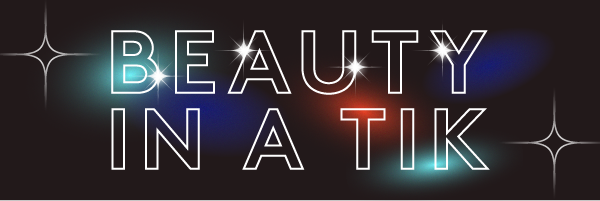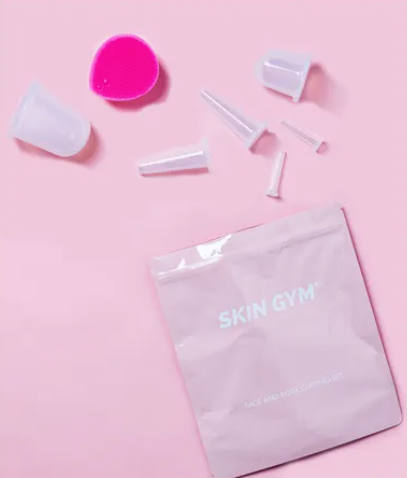At Refinery29 Australia, we’re here to help you navigate this overwhelming world of stuff. All of our picks are independently selected and curated by the editorial team, but we may earn commission or other compensation from the links on this page.
TikTok's beauty enthusiasts can't get enough of clever trends and techniques which promise to transform skin in a matter of moments, and it's safe to say each one has us hooked.
Lately, though, everyone is obsessed with one technique in particular: facial cupping. Judging by the countless tutorials flooding the app, the results are impressive, to say the least.
AdvertisementADVERTISEMENT
What is facial cupping?
Even though cupping is big on TikTok, it's nothing new. The technique has been popular in Chinese and Middle Eastern medicine for centuries. On the body, cupping therapy involves placing glass or silicone cups on either wet or dry skin, which creates a suction effect. This brings blood to the surface of the skin and is said to relax muscles and potentially reduce back and neck pain.
Facial cupping is a little gentler and involves much smaller cups (again, usually silicone or glass) which create a pull on the skin. "Lately it has become a trend for facial use on the premise that the cup uses pressure to draw nutrients to the surface of the skin with the aim of creating healthier-looking skin," says Dr Ioannis Liakas, medical director and skin specialist at Vie Aesthetics. On TikTok, the cups are combined with skincare products like facial oils, serums or masks, which help them glide over the skin easily.
@ohdiarie some real ugly faces yikes, also the oil was for the cupping! #skincare #myskincare #cupping #facecupping #skincareobsessed #skin #skinhacks #massage
♬ original sound - 𝕾𝖊𝖑𝖎𝖓𝖆🦋✨
What are the skincare benefits of facial cupping?
Much like using a jade roller or gua sha tool, TikTokers love the facial cupping technique for relaxing tense facial muscles, especially along the jaw, and claim it lends the skin a post-facial glow when combined with radiance-enhancing skincare products like vitamin C or rosehip oil. It's a favourite among experts, too. Top facialist Antonia Burrell rates facial cupping for providing a temporary lift, while Dr Liakas pinpoints contouring and sculpting cheekbones, as well as de-puffing skin, as benefits. Some TikTok skincare enthusiasts claim that facial cupping helps minimise fine lines, wrinkles and scars, and stimulates collagen.
AdvertisementADVERTISEMENT
How do you do facial cupping at home and does it work?
Inspired by TikTok's skincare enthusiasts (and spurred on by how desperately my dull, post-winter skin is in need of a glow boost), I had to give facial cupping a go. I opted for the Skin Gym Face & Body Cupping Set, $66.
The set includes two medium-size facial cups (for cheeks, chin and forehead) and two micro-facial cups, which perform better around the nose, eyes and lips. Facial cupping works best when combined with skincare so that the cups can slide across the skin without any friction. I found it's actually quite difficult to use the cups sans product, as they keep popping off my skin. Layering up with moisturiser, serum or facial oil means they can do their job with ease.
Facial oils seem to be a popular product to work with on TikTok but Dr Liakas mentions they could clog pores and spread bacteria if you're prone to breakouts. I have oily, acne-prone skin, so I chose a lightweight serum: Farmacy Very Cherry Bright 15% Clean Vitamin C Serum, $74.90. A little goes a long way to create a slick base on the skin. Dr Liakas rates vitamin C serums for facial cupping but says hyaluronic acid serums are also an option and are beneficial for all skin types. You could also use a moisturiser for more slip. Try Weleda Skin Food Light, $26.95, a favourite among makeup artists for prepping the skin and nourishing without stickiness, or Drunk Elephant Protini Polypeptide Cream $122, which repairs skin using proteins as it moisturises.
AdvertisementADVERTISEMENT
Dr Liakas says that keeping the skin taut when passing the cups over your face is key and recommends cleansing your skin afterwards. This is because cupping is more of a DIY facial technique, rather than a skincare step. Simply follow with your usual skincare routine afterwards.
I started with the miniature cups and concentrated them on areas where I'd like a little bit of a lift, which is around my eyes and above my eyebrows. The suction was very gentle and as I glided the cups over my skin, the product absorbed quickly. While I didn't notice an immediate difference in firmness, I saw a change in the skin around my nose and lips, which always tends to be quite swollen when I wake up in the morning.
@jacquelinekilikita I tried #facialcupping and it gave me a radiant, post-facial flush. Here are all the main skin benefits. #facecupping
♬ original sound - Jacqueline Kilikita
I concentrated the large cups along my jawline, which holds a lot of tension as I sometimes grind my teeth when stressed or anxious. I found the suction really soothing and relaxing (more so than my trusty gua sha tool) and after five minutes of gliding the tool back and forth over my skin, any tightness had dissipated entirely. After 10 minutes in total, it felt like my face had been treated and massaged by a professional facialist. The only difference is the price (and the fact that I didn't have to leave my bedroom). I loved the natural glow it gave my skin, too, almost as though I'd just got in from a brisk walk in the cold. As a result, I skipped foundation and blush, and just applied a little concealer for the rest of the day.
AdvertisementADVERTISEMENT
Are there any side effects of DIY facial cupping?
DIY facial cupping is unlikely to leave you with the large telltale marks typical of professional body cupping (especially if you're using silicone cups, which are kinder on the skin) but it pays to be as gentle as possible. Unlike skincare tools such as pore vacuums, the pull of facial cups is relatively light so broken capillaries or blood vessels are rare, although Dr Liakas says they are not out of the question. As with all new skincare tools and techniques, be mindful, especially if you choose a glass set.
It's not a great idea to use cupping tools on broken skin as this could cause further irritation. Dr Liakas also suggests avoiding the technique if you are sunburned or if your skin has been exposed to the sun recently. Likewise, if you have rosacea, sensitive skin or active acne, or you're using retinol and are experiencing flaking or sensitivity, Dr Liakas suggests giving cupping a miss.
@fferlopez Face cupping benefits⚡️ #facecupping #facecuppingmassage #skincare #skin
♬ Steven Universe - L.Dre
I thought I'd find facial cupping to be a faff but there's no denying it works a treat. If you love skincare and are looking for ways to pamper yourself at home, it's an easy, effective and affordable technique.
AdvertisementADVERTISEMENT








